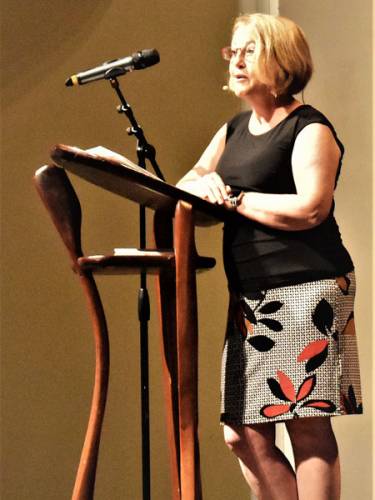Synod School convocation speaker talks about increasing our learning zones to reduce our panic zones
November 13, 2019

Deirdre “Dede” Johnston was the convocation speaker this summer at the Synod of Lakes and Prairies’ Synod School. (Photo by Duane Sweep)
Civility is easy when we’re in our comfort zone, but civility becomes more challenging as we move away from that easy place. But that’s what we need to do — and there’s a way to do it.
That was part of the message Dr. Deirdre “Dede” Johnston brought to this year’s Synod School when she addressed civility in a time of incivility as the midsummer ministry’s convocation speaker.
Johnston, associate dean of global education and professor of communication at Hope College in Holland, Michigan, used three concentric circles to talk about the way we see the world. “We have a very small comfort zone — that little tiny circle” at the center, she pointed out.
Outside the comfort zone is a slightly larger circle — the learning zone — and then the largest circle — the panic zone. We don’t move from one zone to another, but we need to change the size of the zones. It requires effort.
Synod School, a weeklong event described as a learning and personal enrichment experience for people of all ages, is a program of the Synod of Lakes and Prairies. This year it drew 638 participants to the Buena Vista University campus.
“Research suggests that our fears often target people who are different from us, and we use fear to exaggerate these differences,” Johnston said. “What we really have to do is to expand that comfort zone, expand that learning zone … when we do that the panic zone shrinks. That’s what we’re aiming for.”
A first step, Johnston explained, is “to love ourselves as God loves us.” Love, she said, is an act of will, and we must “mend our broken hearts … own yourself … accept yourself … love yourself.”
Johnston said she embraces “wabi sabi,” a traditional Japanese world view that finds beauty in imperfection. “We, too, need to embrace wabi sabi and see the beauty in our own and other imperfections, irregularities, shortcomings. We can embrace the wabi sabi in ourselves, and love ourselves, and forgive ourselves as God loves and forgives us, and then only are we prepared to be civil toward others.”
And to be civil requires relationship, Johnston said. “I think that we can’t have civility if we’re not in relationship with those who may disagree with us.”
She compared “cheap civility,” a civility that stays within our comfort zones, with “cheap grace.” “Cheap grace,” she said, “is grace without discipleship, grace without the cross, grace without Jesus Christ. Cheap civility is comfortable; it’s easy.”
True civility comes with discomfort. It “privileges our comfort over the difficult conversations that we need to have,” Johnston said.
“Discussions about race make white people uncomfortable; therefore, white people don’t want to have conversations about race. Isn’t that what privilege we have?” she asked. Johnston called it “the protection of comfort.”
“To have civility,” she said, “we have to erase that discomfort.”
Johnston cited the friendship that existed between the late U.S. Supreme Court Justice Antonin Scalia and Justice Ruth Bader Ginsburg, who were diametric opposites politically. And she quoted President Abraham Lincoln, who said, “I don’t like that man; I must get to know him better.”
Both examples point in the direction of relationship. “Being in relationship,” Johnston said, “we are more often to do the loving thing, the hearing thing, the considerate thing, the self-sacrificing thing.”
Being truly civil, she said, “requires being in relationship with others who are not like us. Being in relationship means understanding, seeking to understand another’s voice. Being in relationship means recognizing voices that are often silenced in our society and in our communities and listening to those stories.”
Johnston pointed to a South African greeting to describe a first step in recognizing others. The greeting, in English, is “I see you.” The response to the greeting is “I exist.”
It’s in that recognition of others that relationship can begin.
When we begin to love ourselves, accepting the imperfections in ourselves and others, and build relationships outside our comfort zone, truly listening to and learning from and about others, we reduce our panic zone. Civility can begin.
Duane Sweep, Director of Communications for the Synod of Lakes and Prairies
Daily Readings
Morning Psalms 15; 147:1-11
First Reading Nehemiah 7:73b-8:3, 5-18
Or alternate First Reading Nehemiah 5:1-19
Second Reading Revelation 18:21-24
Gospel Reading Matthew 15:29-39
Evening Psalms 48; 4
Today’s Focus: Synod School
Let us join in prayer for:
PC(USA) Agencies’ Staff
Rebecca Kueber, Presbyterian Publishing Corp.
Everdith Landrau, Office of the General Assembly
Let us pray:
Heavenly Father, thank you because Christian students are able to get an education. Bless them, so that they may be a blessing to their families and communities, and a loving testimony of Jesus Christ to all they meet. Amen.